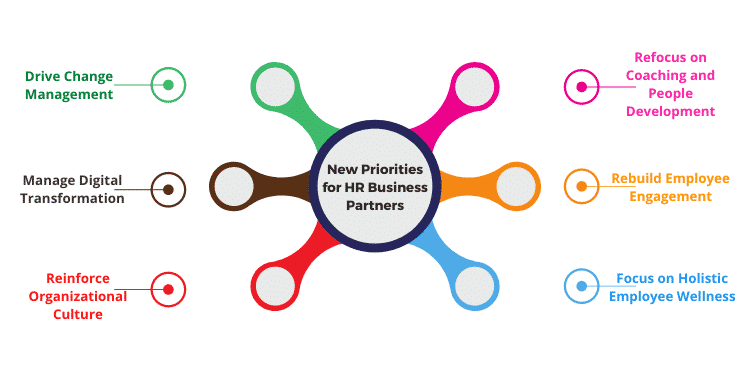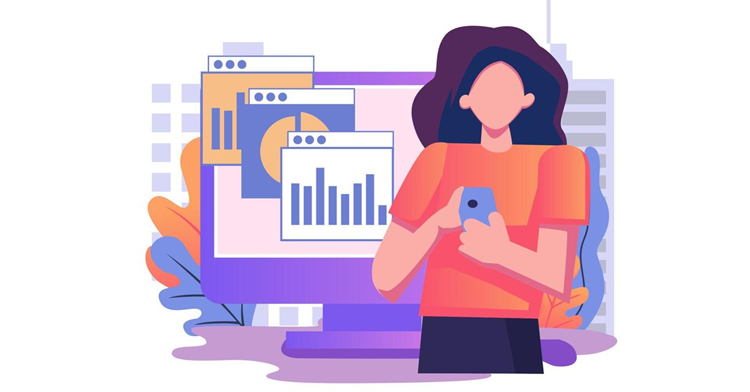1. Drive Change Management and Digital Transformation: HRBPs must lead efforts to adapt HR policies to new work models and drive the adoption of digital tools and platforms.
2. Reinforce Organizational Culture and Employee Engagement: In a hybrid work environment, HRBPs must promote core values, enhance employee engagement, and rebuild connections.
3. Focus on Coaching, Development, and Wellness: HRBPs should prioritize blended learning, mentorship programs, and holistic wellness initiatives that address physical, mental, and emotional health.
4. Develop New Skills: HRBPs must become proficient in digital tools, data analytics, and creative problem-solving to manage remote teams and evolve HR processes effectively.
The COVID-19 pandemic has changed how organizations operate and employees work. These are likely to cause significant changes in the role of the HR Business Partner in the post-COVID world across organizations and the skills required to perform their roles effectively.

The role of the HR Business Partner or HRBP as it is popularly known, is the critical linkage between the organization’s business goals, strategy, and core values and the people operations of a business unit or team.
In the post-COVID world, HRBPs should manage people processes to drive rapid business recovery, continuity, and growth.
Simultaneously, organizations are going through a massive digital transformation in how work is done and managed.
Huge changes in the work environment, triggered by the pandemic and fueled by ever-increasing digitization have created significant changes in the goals and priorities of HRBPs across organizations.
Here are a few of the new priorities for HRBPs:
1. Drive Change Management
2. Manage Digital Transformation
3. Reinforce Organizational Culture
4. Refocus on Coaching and People Development
5. Rebuild Employee Engagement
6. Focus on Holistic Employee Wellness


Work from home and hybrid working will become the new normal in most organizations.
Therefore, organizations should realign, adapt, and revise their HR policies and processes to accommodate this new reality.
HRBPs would be required to play a key role in communicating and implementing such changes.
Hence, their input would be valuable in redesigning the policies.
They should seek and analyze employee feedback to improve their effectiveness when implementing policies.

Organizations are digitizing every people process, including recruitment, onboarding, performance management, recognition, compensation, learning and development, etc.
Hence, organizations invest heavily in HRMS platforms, employee recognition platforms, collaboration tools, performance management systems, etc.
HRBPs would need to play a critical role in driving the implementation of such HR digital platforms, right from understanding the requirements to driving adoption among the workforce.

Also, remote working and onboarding have made it extremely difficult for organizations to promote their core values and build the desired organizational culture.
Hence, in the post-pandemic world, the HRBPs would need to make renewed efforts to reinforce the organizations’ core values among the workforce.
Due to remote working challenges, HRPBs must guide new employees and help them understand and absorb the organization’s culture.

The pandemic and the subsequent changes in the way of work have disrupted the people development process.
Organizations need to reinvest in their people, especially in blended learning and development programs, and create a culture of coaching and mentorship in the new hybrid work environment.
HRBPs should play a critical role in driving these hybrid learning and development models.
They should ensure employee participation and get feedback to tweak these programs.
They also need to guide supervisors to coach and mentor team members, especially those who have joined recently.

One of HR teams’ most significant challenges when managing remote employees is keeping them engaged and motivated.
This will slowly but surely take a toll on employee productivity and retention.
HRBPs need to rebuild employee engagement in the current hybrid work environment.
Employee engagement initiatives that have worked well in the past in the offline world are unlikely to work as effectively.

In the past, employee wellness was restricted to employee health insurance plans, having a fitness center at the office, and conducting fitness sessions occasionally.
The pandemic has changed the paradigm of employee wellness and made it an integral part of people management.
Organizations are not just looking at the physical wellness of employees but also mental and emotional wellness.
HRBPs must drive such wellness programs across the workforce, ensure maximum participation, and track their effectiveness.
The HRBP’s new work paradigm requires skills to be mastered to perform its roles effectively.
A few of these new skills are listed below:

HRBPs need to be highly proficient in the use of various digital tools and technology to stay connected with virtual teams and manage various HR processes digitally.
They might be the first port of call for employees facing issues with the new digital HR tools.
Therefore, they should be able to help them with basic queries.

Also, the significant–scale adoption of digital HR tools will result in vast amounts of HR-related data.
Hence, HRBPs need to analyze and make sense of this data; and generate meaningful insights from it that can serve as inputs for decision-making.
HR-related decisions are likely to be more data-driven than ever before.

In this dynamic work environment, HRBPs are required to be much more creative and come up with out-of-the-box solutions, especially around employee engagement and well-being.
Hence, tried and tested formulas from the past are unlikely to work in this new normal.
Also, read Key Trends in HR for 2021 and Beyond
The tremendous changes at the workplace due to the pandemic would require redefining the role of the HR Business Partner in the post-COVID world to drive higher levels of employee satisfaction and faster business growth/ recovery.

Lead author: Sagar Chaudhuri, the Co-Founder and CEO of HiFives. He is an HR Tech Evangelist with over 25 years of corporate and entrepreneurship experience. In the past, Sagar has worked in leadership roles with companies such as Genpact, Infosys, and ICICI Bank. He has an engineering degree from IIT Kharagpur and an MBA from IIM Lucknow. Connect on LinkedIn
To stay updated on the latest HiFives blogs, follow us on Twitter (@MyHiFives)